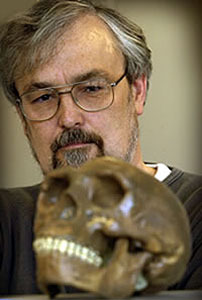
Robin I. M. Dunbar
Professor, Evolutionary Anthropology; Director, Institute of Cognitive & Evolutionary Anthropology, University of Oxford, United Kingdom; Co-Director of the British Academy’s Centenary Research Project, Lucy to Language: The Archaeology of the Social Brain, a multidisciplinary project involving several universities, studying how the human brain evolved and the role language played.
Robin Dunbar will speak on the social brain theory and on what it is to be human and how it is that we came to be that way, the essence of the ongoing research in the Lucy to Language project. Or, as he puts it: “How it is that humans aren’t just great apes.”
Robin Dunbar was born in Liverpool, England, the son of an engineer, but when he was just three months old, his father moved the family to Australia, “the gold mining town of Kalgoorlie and the middle of nowhere,” he says. But he wouldn’t stay in the middle of nowhere much past childhood.
As a “tween,” he moved to East Africa to live with a cousin for a couple of years, which ultimately expanded his educational as well as geographic horizons. It was there a young Dunbar got “hooked” on philosophy, introduced to the subject by his cousin. “He was three years older than I, and had become interested in Bertrand Russell, the great philosopher of mathematics and peace campaigner, as well as Eastern philosophy, especially Buddhist philosophy,” he recalls.
When he was 12, Dunbar was sent to Britain for school and received his early education at Northamptonshire. “Philosophy was not a subject you could do at high school, but I read very widely, and then went to university to study it,” he says. He was accepted at Magdalen College, University of Oxford, and planned to do just that. Except for one thing—he had to study philosophy along with some other subject. “I chose psychology, so I got into science by pure accident,” he says. “It was actually experimental psychology, scientific psychology,” clarifies Dunbar. “That drew me into the sciences despite not having a science background.”
It also drew him into courses taught by such renowned professors as Nikolaas “Niko” Tinbergen—the Dutch ethologist and ornithologist who shared the 1973 Nobel Prize in physiology or medicine with Karl von Frisch and Konrad Lorenz for their discoveries concerning organization and elicitation of individual and social behavior patterns in animals—and Richard Dawkins, author of the controversial The Selfish Gene.
In 1969, Dunbar graduated with a bachelor of science degree in psychology and philosophy from Oxford, then followed it with a Ph.D. in psychology from the University of Bristol in 1974. To earn a living while looking for an academic post, he spent two years as a freelance science writer. “That gave me insight into all sorts of things going on in all different areas,” he says. “And in the end, one of the key features in the history of science is that an awful lot of ideas come from applying ideas from one area to a different area,” he points out. “Having that broad breadth of background really helps you.”
It’s something that comes naturally for Dunbar. After research fellowships at Cambridge, 1977 to 1982; Liverpool Universities, 1985 to 1987; and teaching posts at the University of Stockholm in 1983, Dunbar landed at University College London in 1987, where he was based until 1994. He wound up devoting a lot of his time in those early years to ecology and behavior, in particular fieldwork on primates and antelope. Then, in 1994, he moved on to the University of Liverpool, where he was until last year, when he accepted the position at Oxford.
These days, Dunbar practices as an anthropologist and evolutionary biologist, specializing in primate and human behavior. He is well-known for formulating Dunbar’s Number, a measurement of the “cognitive limit to the number of individuals with whom any one social species can maintain stable relationships”—roughly 150 in humans—and for his 1998 study proposing the Social Brain Hypothesis, which contends the reason humans have such a proportionately larger-than-necessary brain is because, as he paraphrases it, “that’s what allows us our complexity, the ability to step outside our world and ourselves and imagine.”
Elected a Fellow of the British Academy (FBA) in 1998, Dunbar is also a Fellow in Magdalen College. He is the author, co-author, or editor of a dozen books—including Primate Social Systems (1988), The Trouble with Science (1995), Grooming, Gossip and the Evolution of Language (1996), The Evolution of Culture: An Interdisciplinary View (1999), Cousins: Our Primate Relatives (2000), Human Evolutionary Psychology (2002), and The Human Story (2004)—as well as numerous scientific articles.